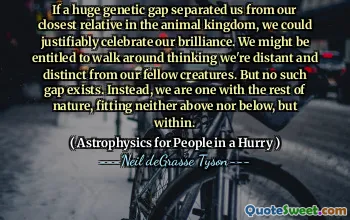
If a huge genetic gap separated us from our closest relative in the animal kingdom, we could justifiably celebrate our brilliance. We might be entitled to walk around thinking we're distant and distinct from our fellow creatures. But no such gap exists. Instead, we are one with the rest of nature, fitting neither above nor below, but within.
This quote compellingly challenges a deeply rooted anthropocentric perspective—the idea that humans stand apart from, and perhaps above, the rest of the natural world by virtue of our intelligence or genetic distinctiveness. Neil deGrasse Tyson's reflection reminds us that the boundaries we often draw between ourselves and other species are more illusory than real. The suggestion that there is no ``huge genetic gap'' places emphasis on our biological continuity with other life forms, especially our closest evolutionary relatives.
In acknowledging that humans do not fit either "above" or "below" nature but rather "within" it, Tyson invites a more humble and integrated understanding of our place on Earth. This viewpoint encourages a shift from supremacy and separation towards kinship and connectedness. Recognizing that we share much of our genetic makeup with other animals loosen our sense of exceptionalism and can cultivate a more ethical relationship with the environment and other species.
From a scientific perspective, this message aligns with the field of evolutionary biology which demonstrates that all living organisms are linked through common descent. This interconnectedness underscores that traits like intelligence, consciousness, and adaptability are not exclusive to humans but exist in varying degrees throughout the tree of life. We are thus participants within a vast and complex ecosystem rather than isolated rulers atop it.
Philosophically and morally, embracing our inclusion within nature challenges us to rethink how we interact with it—prompting questions about stewardship, sustainability, and respect rather than exploitation. The quote ultimately serves as a call for awareness and responsibility, grounded in the realism of genetics and evolution. It invites a paradigm where brilliance is not a rationale for dominance, but a reason to foster unity with all living beings. This resonates profoundly in the context of current environmental crises where understanding our equivalence and obligations to nature is essential to survival.
In summary, Tyson’s insight propels a vital dialogue about human identity and planet-wide coexistence, urging us to transcend ego and embrace our true place "within" the natural world, not apart from it.






